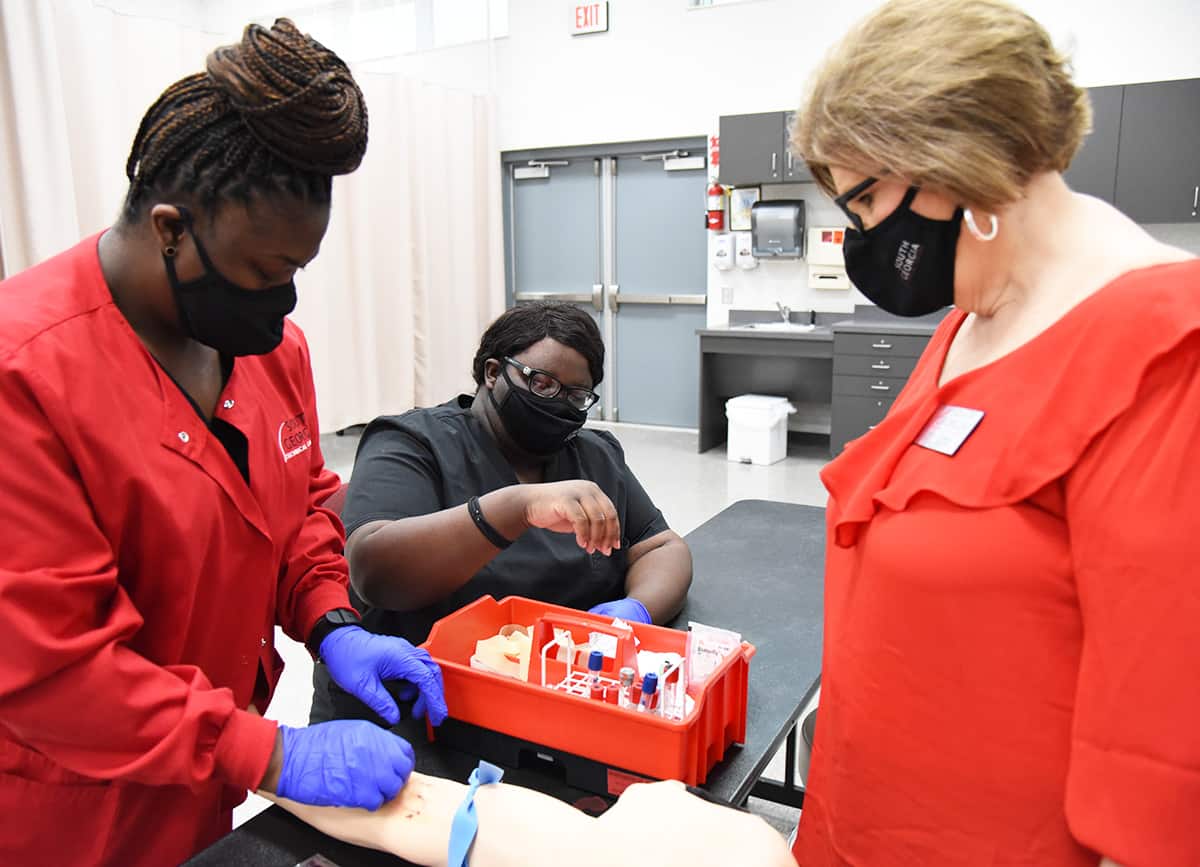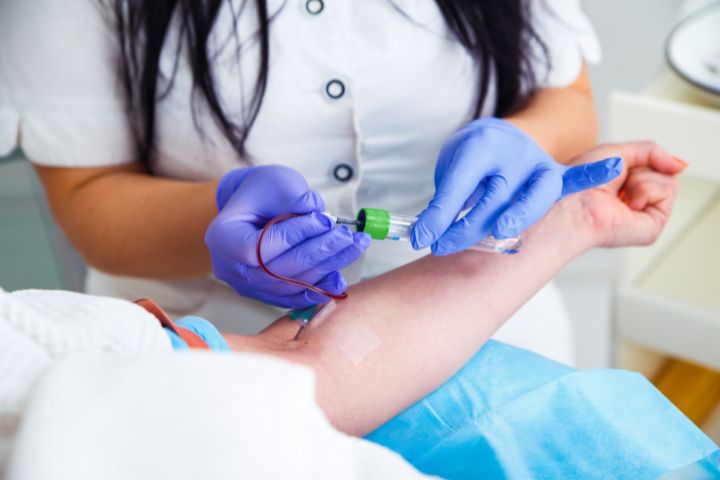The Course to Qualification: Comprehending the Phlebotomy Educating Course Journey and Its Relevance
As you take into consideration the course to certification in phlebotomy, it's important to recognize the duty you'll play in medical care. Your training will certainly cover essential abilities, from blood collection techniques to patient interaction.

The Function of Phlebotomists in Medical Care
Phlebotomists play an essential function in the healthcare system, working as the vital web link between people and essential analysis testing. You'll execute blood draws, making certain examples are gathered properly and safely. Your know-how assists in detecting clinical conditions, monitoring health, and assisting therapy choices.
In your daily communications, you'll need to develop count on with patients, making them really feel comfortable throughout what may be a demanding experience. You are accountable for identifying and handling examples thoroughly to stop contamination or mistakes, which could impact test outcomes.
Yet, you'll often work alongside physicians and registered nurses, interacting essential info concerning people' problems. Your role is essential in keeping the process in health care setups, making certain timely and accurate results. By mastering your abilities, you add meaningfully to person treatment, making you an essential part of the clinical team. Accepting this responsibility is essential to your success as a phlebotomist.
Summary of Phlebotomy Training Programs
When exploring phlebotomy training programs, you'll locate various kinds designed to fit different timetables and discovering designs. Each program helps you establish crucial abilities like blood collection and client interaction. Understanding these options is crucial to picking the appropriate course for your job.
Kinds of Educating Programs
Several kinds of training programs are readily available for those looking to come to be skilled in phlebotomy. Furthermore, some health centers and centers provide on-the-job training programs, providing practical experience while you find out. Whatever course you choose, each program intends to outfit you with the essential skills for a successful phlebotomy career.

Secret Skills Created
Grasping phlebotomy requires a set of vital skills that are created with complete training programs. You'll discover technical skills like correct blood vessel option, needle insertion, and blood collection methods. These hands-on techniques guarantee you can perform procedures securely and successfully. Furthermore, communication abilities are fundamental; you'll require to communicate with clients, discuss procedures, and put them comfortable. Understanding anatomy and physiology is vital, too, as it helps you situate veins and recognize the body's reaction to blood attracts. Lastly, you'll acquire understanding of safety and security protocols and infection control, assuring you preserve a sterile environment. Each of these abilities is vital for your success as a licensed phlebotomist, making you a useful asset in any medical care setting.
Key Elements of a Phlebotomy Program
In a phlebotomy course, you'll concentrate on important subjects that lay the foundation for your future job. You'll engage in hands-on training that enables you to apply what you've found out in real-world settings. Both the curriculum and sensible experience are important for your success as a phlebotomist.
Curriculum Overview
While pursuing a phlebotomy training course, you'll run into a curriculum created to outfit you with essential skills and understanding. Phlebotomy Courses Near Me. This curriculum commonly includes makeup and physiology, concentrating on the blood circulation system and recognizing blood elements. You'll also learn more about various sorts of blood collection techniques, including venipuncture and capillary puncture techniques
Additionally, infection control and security methods are necessary components, guaranteeing you recognize just how to preserve a clean and sterile environment. You'll research patient interaction, emphasizing interaction and compassion, which are vital for relieving client anxiety.
Hands-On Training Experience
Obtaining hands-on experience is an essential component of your phlebotomy training program. This practical training permits you to apply what you have actually learned in a real-world setting, improving your abilities and confidence. You'll practice venipuncture methods, learn just how to deal with different types of samplings, and obtain accustomed to the devices made use of in the field. Under the assistance of knowledgeable teachers, you'll fine-tune your abilities, guaranteeing you're planned for any scenario you might face.
Additionally, you'll obtain the opportunity to interact with patients, which is important for creating your communication skills. This mix of technological proficiency and interpersonal skills is critical for your success as a licensed phlebotomist. Eventually, hands-on training is where theory meets method, strengthening your navigate to this website understanding and readiness for qualification.
Qualification and Licensing Needs
Prior to you can start your occupation in phlebotomy, it is vital to understand the accreditation and licensing requirements that vary by state. Most states call for phlebotomists to hold a qualification from an identified organization, such as the National Phlebotomy Association or the American Culture for Professional Pathology. These qualifications usually entail passing a test that evaluates your expertise and skills in the area.
Along with qualification, some states have details licensing requirements. You may need to finish a specific variety of hours in professional technique, submit evidence of training, or undergo a history check. It is necessary to investigate your state's regulations to make sure you fulfill all required criteria.
Remaining informed about these demands not just aids you safeguard a setting but also enhances your reliability as an expert. By fulfilling these requirements, you'll be well on your method to an effective career in phlebotomy.
Hands-On Training and Practical Experience
Hands-on training and sensible experience are essential elements of your phlebotomy education and learning, as they enable you to apply academic expertise in real-world scenarios. Throughout your training, you'll take part in supervised venipuncture, learn proper techniques, and come to be knowledgeable about numerous blood collection devices. This direct participation is vital for constructing your confidence and developing your abilities.
You'll work carefully with skilled experts who can lead you via the nuances of person communication and sample handling. Each practice not only enhances your understanding but likewise prepares you for the hectic environment of medical care setups.
Additionally, several programs include professional turnings, enabling you to experience diverse setups, from health centers to outpatient facilities. This direct exposure assists you adjust to different challenges and patient requirements, ensuring you're well-prepared for your future function. Accept these chances, as they're necessary to becoming a proficient and thoughtful phlebotomist.
Obstacles Dealt With Throughout Training
While getting hands-on experience is important, it's essential to acknowledge the obstacles that can arise during your phlebotomy training. Furthermore, mastering the abilities required for blood attracts takes practice; you might have a hard time with strategy initially.
Time management can also be a hurdle, as balancing theory, useful sessions, and personal dedications can really feel challenging. You might encounter varying learning rates among your go peers, resulting in feelings of insecurity if you assume you're dropping behind. Lastly, adjusting to the various personalities of trainers can be challenging, as each might have an one-of-a-kind mentor style.
Acknowledging these obstacles early can prepare you for success and aid you develop durability throughout your training trip.
Job Opportunities After Qualification

As you gain experience, you might also consider specializing in locations like pediatric or geriatric phlebotomy, accommodating specific client demands. Some phlebotomists pick to advance their jobs by becoming research laboratory service technicians or going after additional education in healthcare areas.
In addition, your qualification can bring about functions in training or supervising new phlebotomists, permitting you to share your knowledge. With the medical care sector constantly expanding, look at this now your skills will certainly constantly remain in need, leading the way for a secure and meeting occupation. Accept the opportunities waiting on you!
Regularly Asked Questions
What Is the Regular Period of a Phlebotomy Training Training Course?
Phlebotomy training courses typically last around four to 8 weeks. You'll take part in hands-on practice, classroom instruction, and on the internet discovering. Completing this training prepares you for certification and a gratifying job in healthcare.
Are Online Phlebotomy Courses Available?
Yes, on the internet phlebotomy courses are available. They use adaptability and ease, enabling you to study at your own speed. Simply confirm the program is certified to satisfy qualification demands and gain important abilities for your occupation.
Just How Much Does Phlebotomy Training Commonly Price?
Phlebotomy training commonly costs in between $700 and $2,500, relying on the program and place. You ought to take into consideration elements like program size, consisted of products, and hands-on experience when selecting the ideal training for you.
What Prevail Requirements for Phlebotomy Training?
Typical prerequisites for phlebotomy training commonly consist of a high institution diploma or GED, booster shots, and a background check. Some programs might also call for fundamental health care expertise or accreditations, guaranteeing you're prepared for hands-on training.
Can I Function While Completing My Phlebotomy Training?
Yes, you can function while completing your phlebotomy training. Many trainees balance tasks with their researches, yet make certain to handle your time effectively to ensure you meet both job and training dedications efficiently.